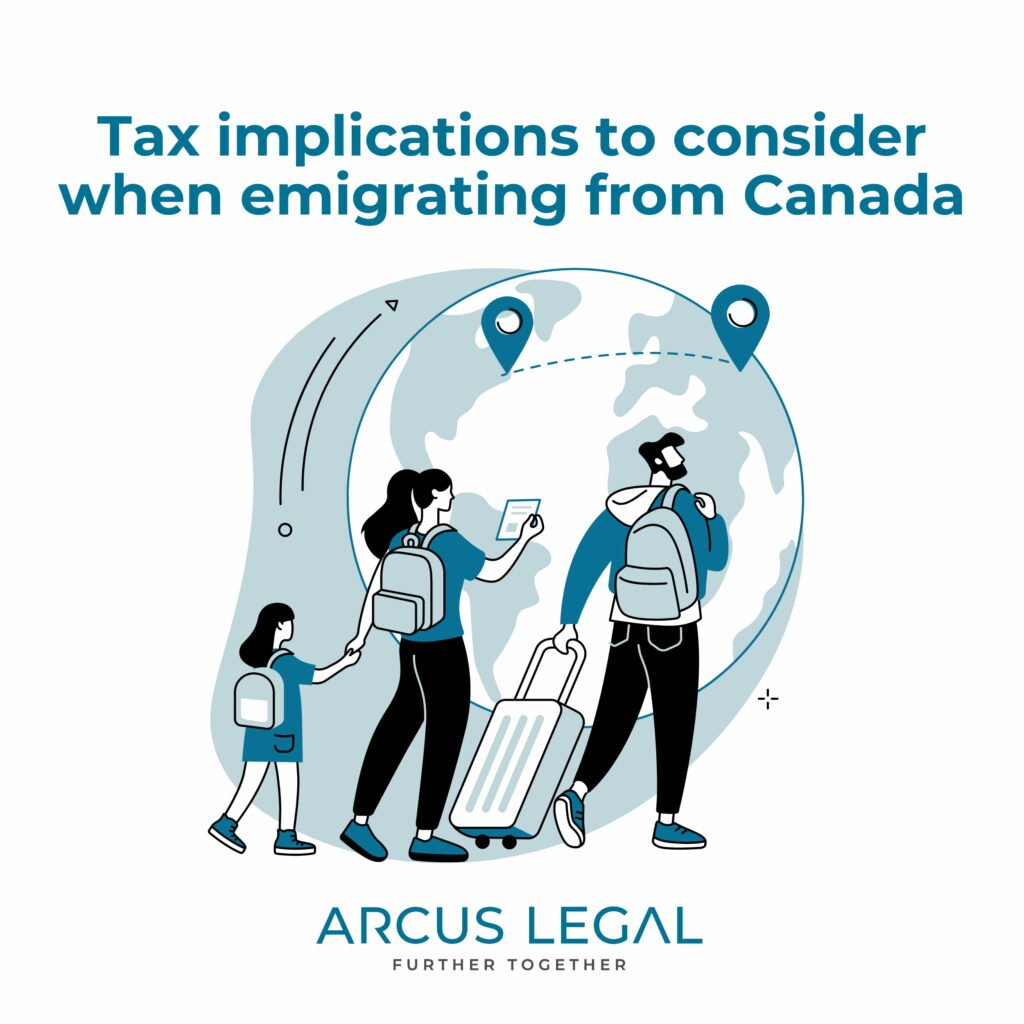Article by Johann Du Plessis, BComm, LLB, LLM (Tax)
Considering a move away from Canada? The tax implications are crucial to understand. Emigrating from Canada involves navigating complex tax rules that can significantly impact your financial planning.
We have been asked several times after the 2024 federal budget what the tax implications of emigrating from Canada will be. We do not specialize in emigration but decided to give a brief description to our clients of issues to consider. When a Canadian resident decides to emigrate, they are subject to certain tax implications that can significantly affect their financial planning. The primary consideration is the “departure tax,” which operates under the assumption that the individual has disposed of their property at its fair market value on the day they leave Canada. This can lead to a deemed disposition of assets, triggering capital gains tax.
Deemed Disposition
Upon emigration, a taxpayer is deemed to have sold most of their assets for fair market value and immediately reacquired them for the same amount. This deemed disposition applies to assets such as stocks, bonds, and real estate, but not to Canadian real property, Canadian business property, or pension plans. The resulting capital gains (or losses) are included in the taxpayer’s income in the year of emigration.
Tax on Deemed Disposition
The departure tax can be significant if the emigrant owns substantial capital assets or investments that have appreciated in value. Any capital gain realized due to the deemed disposition is taxable in Canada. However, there are mechanisms to defer the payment of this tax. Form T1243 and Form T1244 can be filed to defer the departure tax by providing security to the Canada Revenue Agency (CRA) if necessary.
Principal Residence
A Canadian resident’s principal residence is exempt from the deemed disposition rule. This means that if an individual designates a property as their principal residence for every year they owned it, they may not owe any tax on the capital gains generated by that property.
Pensions and Retirement Plans
Special rules apply to pensions and certain retirement accounts. For instance, Registered Retirement Savings Plans (RRSPs) and Registered Retirement Income Funds (RRIFs) are not subject to the deemed disposition. However, withdrawals from these plans after emigration may be subject to non-resident withholding tax under Canadian tax law and the tax treaty between Canada and the resident’s new country.
Non-Resident Taxation
After leaving Canada, an individual becomes a non-resident for tax purposes and will be taxed only on Canadian-source income. This includes income from businesses operating in Canada and gains from disposing of taxable Canadian property. The withholding tax rates and rights to tax may be adjusted if there is a tax treaty between Canada and the new country of residence.
Tax Treaties
Canada has tax treaties with many countries, which can provide relief from potential double taxation. These treaties typically define which of the two countries has the right to tax various types of income. Emigrants should consult the relevant tax treaty to understand their obligations and entitlements.
Reporting Requirements
Upon emigration, individuals must file a departure tax return by April 30 of the following year. This return will cover the part of the year when they were still a resident of Canada. They must report all income received from January 1 until the date of departure. It is also essential to inform the CRA and other relevant institutions (banks, employers, etc.) of the change in residency status to ensure that appropriate non-resident withholding taxes are applied.
Conclusion
The process of emigrating from Canada involves complex tax rules that can lead to significant financial consequences. It is crucial for emigrants to plan their departure carefully, considering the deemed disposition of assets, the potential for double taxation, and the specific rules around retirement savings and property. Consulting with a tax professional who is knowledgeable about both Canadian tax law and the tax laws of the destination country is highly recommended to navigate these challenges effectively.
See the following sources for more information:





